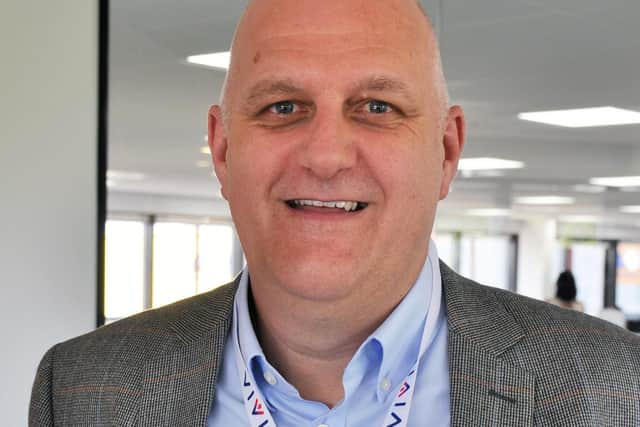Health in Mind: Mental health at home has become a priority for one housing association


But that isn’t always the case and for some people living with mental health issues their home life can be equally as difficult.
With this in mind Vivid, which provides social, affordable and private homes around Hampshire, is trialling a new service in partnership with Solent NHS Trust to help tenants with mental health problems.
Advertisement
Hide AdAdvertisement
Hide AdSince December last year two wellbeing workers have been employed by Vivid to help any ‘vulnerable’ tenants who could benefit from support for a range of issues that could impact their mental health including any illnesses, debt, rent arrears and even anti-social behaviour where they live.


These tenants are often first identified by other Vivid staff who refer them to the wellbeing workers. They are then offered help from the appropriate local mental health groups.
For Derek Streek, head of neighbourhoods at Vivid, considering people’s mental health was just as important as other housing association duties.
‘One of our aims is to help keep vulnerable tenants in their homes,’ he said.
Advertisement
Hide AdAdvertisement
Hide Ad‘Quite often we find that people with mental health issues get into problems with debt as well, which could lead to them having to leave their homes. It’s in everyone’s interest to stop that from happening.


‘We found that mental health services are great when there’s a crisis but due to austerity a lot funding was reduced for preventative services, which are so key. Whilst we can’t close this gap at least help the best we can.
‘We want to avoid those crisis scenarios. This benefits the health services as well as our tenants.’
Although the wellbeing workers are able to connect tenants to outside mental health services, sometimes the solution can be provided by Vivid itself.
Advertisement
Hide AdAdvertisement
Hide AdDerek added: ‘The wellbeing workers discovered one case where there were two people with mental health issues who lived next door to each other. They were causing a nuisance for each other. We were able to move one of them to a new home.
‘There was another case where one of our tenants was going to their GP on almost a daily basis about a mental health problem. Our workers were able to get them the support they needed and prevent them constantly going to the doctor, reducing the strain on health services.’
Cleon Hutton, who manages the wellbeing workers, explained how the new service works. ‘Vulnerable customers are identified and referred to us by many of our front-line teams in tenancy support, neighbourhoods, customer experience and repairs.
‘The wellbeing workers are highly trained in key areas that include mental health awareness and first aid and we have developed active links with health services partners. We work with each customer to assess their challenges and I work with them to develop their own plan for care and support.
Advertisement
Hide AdAdvertisement
Hide Ad‘This may involve working with them to access their GP or engage in Improving Access to Psychological Therapies (IAPT) - talking therapies or other wellbeing services such as Mind.’
She added: ‘Our work is important because poor mental health can impact someone’s life and living situation catastrophically. Many of our customers in our social housing are more vulnerable and find it harder to get help because of their situation. We’ve identified those in social housing with poor mental health are most likely to fall into arrears with their rent and bills, build up debt, struggle with employment and become homeless.
‘Additionally, if our customers are struggling with issues such as debt, addiction, relationship breakdown or bereavement this can cause poor mental health. It can be a very difficult cycle if there is no one there to support them. Our work helps to prevent people losing their home and we can support them to keep well and healthy.’
Vivid provide homes, services and support to 70,000 customers in Hampshire, Berkshire and Surrey.
Advertisement
Hide AdAdvertisement
Hide AdIf the wellbeing worker trial proves successful there is scope to make it permanent.
VIVID wellbeing worker Lauren Green explained how her role has benefitted tenants.
She said: ‘I’ve been supporting a customer who has significant mental health issues and is in high rent arrears. The customer was not able to leave his home due to their mental health issues and their mum was very concerned for their wellbeing.
‘Together with adult services mental health team we’ve worked to support the customer get himself back on track with his medication, his home and his bills. A package of care is soon to be in place which will take some of the pressure off mum as well. We also got our money advice and benefits team to get involved and support with their benefit claim which will hopefully help to reduce the rent arrears.
Advertisement
Hide AdAdvertisement
Hide Ad‘Both the customer and their mum are so grateful for our support, they said that without it things would have been so much harder and stressful and could have resulted in the customer’s tenancy being placed at higher risk.
‘As a wellbeing worker our work is important as it gives individuals the support and voice to access the right care and help that they need. We’ve also been able to build key relationships with health services and voluntary community sectors to work together to better support our customers to help them manage their self-care and recovery and work towards goals that they want to achieve.’
Partnership manager Cleon Hutton added: ‘I’m working on a case involving the exploitation of one our customers – this involves multi-agency working with the NHS, social services, the police.
‘It’s not resolved yet, but I’m helping the customer to have his views heard as the process progresses and to get him back engaged with mental health services. The customer is now safe and secure but we now need to find him a forever home and ensure he gets the care and support required to stay well.’